#Sonia Friedman
Text

Curtain call for Merrily We Roll Along, Tuesday 18 June 2024, the first show after the Tony awards. Maria Friedman being celebrated AS SHE SHOULD. I love that Daniel Radcliffe is the one to bring her onstage; also love the hug and celebration between her and her sister Sonia Friedman, one of the show's producers.
8 notes
·
View notes
Text
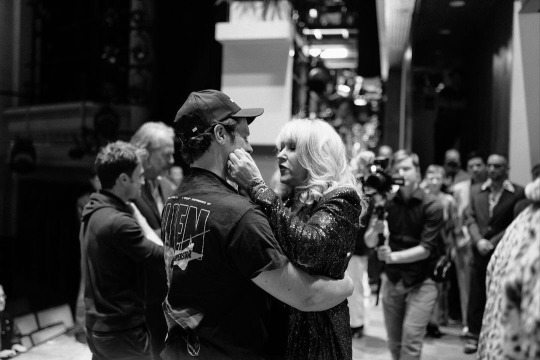
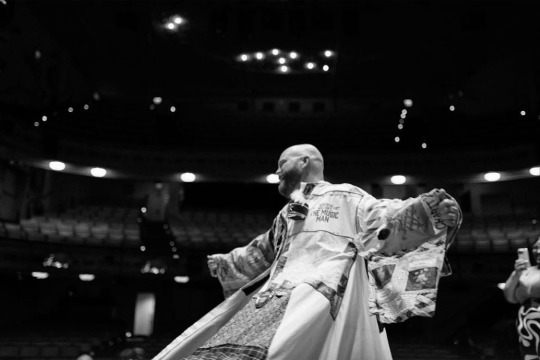
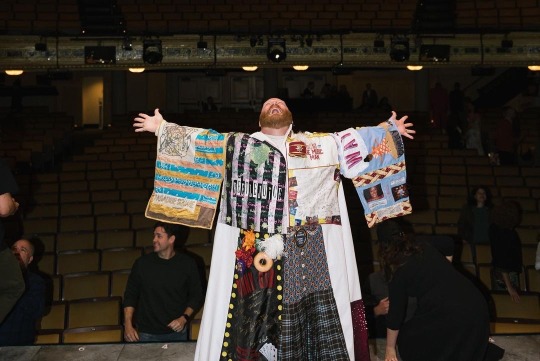

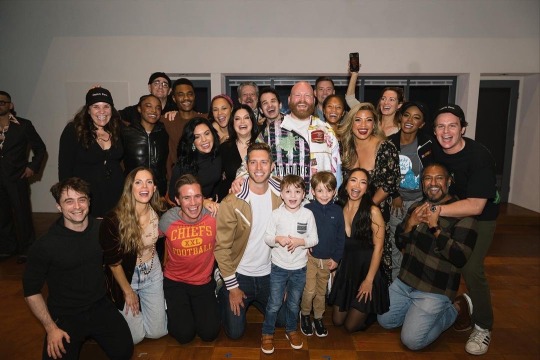

Repost from @merrilyonbway
•
At every Broadway opening night, the chorus member with the largest number of Broadway credits is honored as the recipient of the esteemed Legacy Robe. The #MerrilyOnBway family was thrilled to gather and honor @jacobkeithwatson as our recipient ❤️🎶
📸: @andyhenderson @michaelah.jpg
…………………………………
Includes a picture of Jonathan hugging Sonia Friedman (Merrily producer, and sister of the director, Maria Friedman).
9 notes
·
View notes
Text


I would consider this a *glow up* if ever there was one ❤️
1 note
·
View note
Text
A West End must see!
Me an’ ‘er!
I’ve just returned from a brilliant night at the Harold Pinter Theatre in the West End. Well done Jezz Butterworth, Sonia Friedman, Sam Mendes and the entire cast! Not a weak performance. An unexpected pleasure. Go see it! Although it finishes soon in London – it’s heading to New York.

View On WordPress
0 notes
Text
Personally, I don't want to live in a world where little boys playing with dolls and little girls who don't like wearing pink are subjected to lifelong medical intervention because lunatics think these kids are in the wrong body. If that's the right side of history, then history can go f**k itself." - Graham Linehan
Stretched out on a hospital trolley after a surgeon had removed my cancer-riddled testicle, waiting for a doctor to give me the all-clear to go home, I lazily opened Twitter.
This was five years ago and, at this point, I had not quite nailed my colours to the gender-critical mast. I had defended women being smeared with the slur 'Terf' (for 'trans-exclusionary radical feminist') and was being monitored by trans activists as a result. This made me nervous, though I wasn't quite sure why.
I'd had an inkling of what I was up against when my wife Helen and I played a small part in repealing Ireland's draconian abortion laws. Working with Amnesty International, we appeared in a video in which Helen spoke of terminating a pregnancy because the foetus she was carrying had an abnormality which would have resulted in death moments after birth.
We tried to attend every protest and, at one event, I remember some strange person with a bullhorn bellowing out this nonsense: 'We want the state to pay for abortions!' [general cheering] '...and surgeries for trans people' [puzzled mumbling].
I felt uneasy. Sure, let's talk about trans rights, but first things first. We hadn't yet won the fight on abortion.
In retrospect, this was the first sign I had of the sleight of hand that would allow a sinister movement to attach itself to progressive causes and wrap itself in their stolen banners.
Then, when Ireland voted to overturn the abortion ban, Amnesty Ireland tweeted that this was a victory for 'pregnant people'. I was enraged.
My wife wasn't a 'pregnant person'. She was a woman, and a mother.
But these were only the first ripples of a gathering tsunami of madness. Online, people had started to go dangerously insane. It was such a slow process that I didn't notice it at first, but now, as I lay in hospital, I was collecting my thoughts on the subject.
I knew my positions were thought-through and sound, and I was sure that once people saw I was arguing in good faith, they'd see the problems with gender ideology and we could have a sensible, grown-up conversation about it.
I also told myself that, as co-writer of well-loved television sitcoms Father Ted and The IT Crowd, I had an audience out there who would listen to me. So I sent a few tweets carefully outlining my argument.
Meanwhile, I was in intense pain from the wound under my bandage and, when I was finally told I could go home, I couldn't stand up. A bed was found for me and I lay there, enjoying a bit of peace until the morphine wore off.
The visitors had gone and all was quiet. I decided to have a look at Twitter (now X).
My careful explanation of my position had certainly had an impact.
A trans activist and journalist called Parker Molloy, who identifies as a woman and is enraged if anyone disagrees, had sent me a number of increasingly frenzied direct messages.
After the third or fourth time telling Molloy I was in hospital, I ended the conversation. Meanwhile, another tweeter hopped into my replies to say, 'I wish the cancer had won'.
My ordeal had begun. Cast adrift, I was about to lose everything — my career, my marriage, my reputation.
A little bit after my brush with cancer, I brushed with something almost worse. A biological male, now going by the name Stephanie Hayden, was determined to wreck the life of anyone who flouted trans dogma.
A woman was arrested at home in front of her two young children and put in a prison cell for seven hours after she referred to Hayden on Twitter as a man.
When I made a public accusation about Hayden on X, Hayden didn't challenge it.
Instead, I was accused of breaking confidentiality by publicising Hayden's former male identities.
Hayden reported me to the police. The Guardian, whose editors seemed to have given up any pretence of being even-handed on this issue, published an article headlined 'Graham Linehan given police warning after complaint by transgender activist'.
It claimed I had been given a 'verbal harassment warning' by police acting on Hayden's complaint. This was untrue. I'd been phoned by a policeman who seemed confused when I told him that I'd blocked Hayden on Twitter months ago, so could hardly be accused of harassment.
The policeman then said something like 'stay away from her, awright?' and rang off.
For a national newspaper to headline this as a 'harassment warning' — a formal document that needs to be delivered in writing — was disgraceful, but typical of how many journalists liked to frame things that involved feminists and their allies.
After seven months of wrangling, the paper eventually removed the word 'harassment', which was too little, too late.
By then, the 'police warning' had morphed on social media into 'police caution' — which is issued where a crime has been committed and requires an admission of guilt, neither of which had happened. The false claim that I received a police caution for transphobia is constantly repeated to friends and colleagues to justify my cancellation. It was even presented to my publisher as a reason not to publish this book from which you are reading an extract. I found it grimly funny that the police and media were acting as reputation managers for a character like Hayden, but my wife Helen was terrified at being targeted in this way.
Hayden and Adrian Harrop, a Liverpool-based GP who was temporarily suspended from practising medicine as punishment for his aggression towards women on Twitter, trolled a Catholic journalist called Caroline Farrow, live-tweeting a visit to her home in a way that seemed designed to frighten and intimidate her.
She was about to travel to the U.S., but her visa was withdrawn. Harrop tweeted that he'd just visited the U.S. embassy in London: 'Consular staff very efficient at dealing with my important diplomatic business,' he wrote, with a wink emoji.
In a tweet, I called Harrop 'Doctor Do-Much-Harm'. The next morning, the police turned up at my door. I told them I wouldn't be changing my online behaviour one iota, and that Harrop bullied women online.
The policeman nodded, said something about free speech, and left. However, that visit wore heavily on my wife.
But the likes of Hayden and Harrop could not have had such success without accomplices in the police and the Press. It was surreal how swiftly they gained such power over society.
As for my career as a successful television scriptwriter, that proved to be over before the stitches from my cancer operation had healed.
Around this time, I received a letter from Sonia Friedman, one of the biggest theatre producers in London's West End, about me writing a new companion piece for the late Peter Shaffer's classic one-act farce Black Comedy.
I was apparently 'top of our dream list' to pen it.
Black Comedy is possibly the most ingenious farce ever written. I'd seen it years before with David Tennant in the lead and it left me giddy and envious. Now, going from lowly sitcom writer to being considered worthy of pairing with Shaffer had me floating.
Not for long, though. Only a few days later, Shaffer's estate decided on the late playwright's behalf that they 'didn't want to get involved' by 'taking one side or the other'.
More jobs began to fall away. A tour to Australia to teach comedy was cancelled because the company claimed it 'wouldn't be able to afford the security'. I discovered later this was a standard excuse given to those of us declared unclean by the new sacred class.
I'm also the person who worked with comedians Steve Martin and Martin Short for the shortest period of time. Five minutes, I think it was. A producer invited me to develop a comedy-drama TV series in which both would star. I had a flat-out offer and then, within minutes, an email from the same producer rescinding it, I suspect after a Twitter user in his office told him I was a bigot.
Even what I thought would be my pension was taken away from me. There were plans to make a musical of Father Ted, written and directed by me, which I was certain would be a huge hit, perhaps even make my fortune if I could get it right.
I hadn't reckoned how resolute the forces against me actually were, and how quiet my colleagues would be in the face of their onslaught. Sonia Friedman, the producer, told me I was 'on the wrong side of history' and advised me to 'stop talking'.
I suddenly found myself in a raging argument with this powerful woman who held my musical in her hands. But hearing one of these copy-and-pasted, thought-terminating clichés from the mouth of a colleague was more than I could bear.
Personally, I don't want to live in a world where little boys playing with dolls and little girls who don't like wearing pink are subjected to lifelong medical intervention because lunatics think these kids are in the wrong body. If that's the right side of history, then history can go f**k itself.
The meeting ended with each of us trying not to catch the other's eye in case it kicked off again.
I thought at least that Jimmy Mulville, the head of Hat Trick Productions, was on my side.
As the original producer of Father Ted, the company had a big stake in this new venture. But now the Hat Trick people began to go the other way.
I had another meeting around the supposed problem of my defending women and girls, in which, as always, no one could locate the flaw in my analysis as I explained over and over again: 'Children are being hurt. Women are losing their sports, their language, their privacy.'
Finally, I referred to the violent, terroristic nature of trans rights activism. Casually, off-handedly, Jimmy said: 'Well, there's bad behaviour on both sides.'
'Both sides' is a poisonous smear. No one on my side of the argument insists that people should be shunned by polite society. No one on our side wears T-shirts with slogans such as 'Kill all Terfs' and 'Die Terf Scum'.
I was told by one acquaintance: 'Some of the things you've done have been questionable.' 'Give me an example,' I replied. Long pause. 'All right, well maybe not.'
The final act was a meeting in the Hat Trick offices in which Jimmy told me I was to remove my name from Father Ted The Musical or he would not make the show — my show, which I had been tending, rewriting and refining for the best part of half a decade.
Once again, I asked what I was being accused of.
Jimmy rolled his eyes, as if it was self- evident. Desperately, I tried to explain what was happening to women's rights, and to the young girls mutilating themselves because of — 'I DON'T CARE!' Jimmy shouted. I left.
Later, I heard from my agent that in return for declaring me an unperson, Hat Trick was suggesting an up-front payment of £200,000 as an advance on my royalties. Initially, I agreed to go along with it, because I needed the money. But then I changed my mind.
I saw an interview with the mother of one of the women competitors who found themselves up against the trans swimmer Lia Thomas.
Lia was still physically intact and all the girls worked out how many towels to take into the locker room to cover themselves up completely as they changed.
'I asked my daughter what she would do if Lia was changing in there,' said the mother. 'And she said resignedly, 'I'm not sure I'd have a choice.' I still can't believe I had to tell my adult-age daughter that you always have a choice about whether you undress in front of a man.'
What messages have these girls been receiving?
My heart was ripped apart. I closed the door for ever on making any kind of deal with Hat Trick. I was prepared to betray myself for £200,000, but I couldn't abandon my daughter.
BEFORE the gender hoopla, I only knew people in the media. Now I had been so effectively cancelled that virtually no one in the media would return my calls. But I began to count as friends social workers, police officers, solicitors, barristers, doctors, nurses and academics who sided with me or shared my experience.
One of the few people I still know in the creative arts is the choreographer Rosie Kay.
At a party at her home in Birmingham for her company of young dancers — some of whom went by 'preferred' pronouns — the conversation turned to her plan for an adaptation of Virginia Woolf's gender-bending Orlando.
The discussion turned heated as she explained that she strongly believed in the reality of sex because she and her son had both almost died while she was in labour.
During that ordeal, her womanhood was literally a matter of life and death for her.
Her husband would never know that experience, and that difference between them meant something.
To the little sparrows of the Church of Gender, this was all high heresy, and could not be tolerated. The dancers harangued Rosie to such an extent that she hid in her own bathroom, then they formally complained about her to the company chiefs.
'They cancelled Orlando and then were making efforts to re-educate me, to stop me from centring women's rights in my future work,' Rosie told me. 'I had to resign from the company I founded.'
Then there's the children's author Rachel Rooney, who wrote a picture book called My Body Is Me. Its message was that children should be happy with their body.
But trans rights activists dislike any mention of being happy with your body as it undermines their message that being trans is a thrilling and transformative lifestyle choice.
Tweets called the book terrorist propaganda and likened Rachel to a white supremacist.
The author's 'trade union', the Society of Authors, declined to offer support. So devastating was the experience that Rachel stopped writing books for children and has now taken on a part-time care job.
But what did Rachel do to deserve cancellation? She wrote a beautiful, kind, responsible book for children, and she got the same treatment I received: they tried to destroy her life. Trans activists mostly target women for disagreeing with them, but I'm not the only man to have suffered. Some 30 years after we'd first worked together, I crossed paths once more with the comic actor James Dreyfus (Constable Kevin in The Thin Blue Line).
I persuaded him to sign a letter asking Stonewall, the former lesbian and gay rights charity which has altered its remit and done more than any other institution in the UK to promote extreme gender ideology, to reconsider its stance.
James agreed without hesitation. The letter argued that Stonewall was 'seeking to prevent public debate of these issues by branding as transphobic anyone who questions [its] current trans policies'. It asked the charity to 'commit to fostering an atmosphere of respectful debate'.
Stonewall refused. Even asking the question was painted as a moral failing. Five years later, James is still being hounded by trans rights activists and he has had difficulty finding work.
In 2021, the company Big Finish released Masterful, a celebration of 50 years of Doctor Who's arch-enemy, The Master, who James had played on its audio productions.
The credits featured every living actor who had taken the iconic role… except James. When the history of these years is written, it's not only the extremist activists who will be recalled with revulsion, but also the spineless corporate figures who never made an attempt to resist them. Their inaction contributed to the ruin of James's livelihood.
A brilliant comic actor, a gay man, was abandoned by the very people who should have had his back, because the celebrity class is more interested in looking like they're doing the right thing than actually doing it.
Meanwhile, a chasm was opening up between me and my wife as she watched me lose jobs and opportunities.
Helen was looking for normality, and I was perpetually dismayed and angry. She asked me to cease operations, which she was perfectly within her rights to do to protect our family.
But I couldn't do it. I knew what everyone who's in this fight knows — the Gender Stasi never forgive.
I could never be confident of a having a job again until the entire gender ideology movement, which has caused so much misery, was burnt to ashes.
Even if I had been prepared to recant or keep my mouth shut, it wouldn't do any good because my heresy was out there and would never be forgiven.
I could never be confident of a having a job again until the entire gender ideology movement, which has caused so much misery, was burnt to ashes.
Even if I had been prepared to recant or keep my mouth shut, it wouldn't do any good because my heresy was out there and would never be forgiven.
I was fighting for women and children, sure, but also for my reputation and my ability to make a living.
With my marriage now over, I left the family home and moved into a modest flat. It had a nursing home for old people to one side and an overgrown, neglected graveyard behind it — which is a little too symbolic of my situation for comfort.
Adapted from Tough Crowd by Graham Linehan (Eye Books, £19.99) to be published October 12. © Graham Linehan 2023. To order a copy for £17.99 (offer valid to 15/10/2023; UK P&P free on orders over £25) go to mailshop.co.uk/books or call 020 3176 2937.
#Graham Linehan#TRAs attaching themselves to other causes#TRAs wanting free stuff#Only women can get pregnant#Father Ted#The IT Crowd#how many identities did Hayden have before transitioning?#The Guardian and poor journalism#A TRA got a women’s visa withdrawn and we are supposed to believe the man in a dress is oppressed?#Sonia Friedman is a TRA handmade#Jimmy Mulville is a coward#The Society of Authors abandoned Rachel Rooney#James Dreyfus may have portrayed a villian but he has more integrity than the producers of Big Finish
40 notes
·
View notes
Text






Star Trek The Next Generation Special #2 (1994) by DC Comics
Written and drawn by various, cover by Sonia Hillios.
#Star Trek#Star Trek TNG#Star Trek The Next Generation#The Next Generation#Special#DC Comics#Chris Claremont#Chris Wozniak#Jamie Finney#Etsy#Vintage Comics#Comic Books#Comics#Captain Picard#Enterprise-D#Gordon Purcell#Michael Jan Friedman#Ensign Ro#Klingon High Council#Sonia Hillios
1 note
·
View note
Text
Sonia Friedman sharing that Sondheim had choked up and said he was so sad that he'd let everybody down back during first production of Merrily We Roll Along......
And Sonia standing on stage, after the final performance of the Tony Award winning revival 43 years later, saying, "Well, Mr. Sondheim, Merrily was a work of art then, and it sure is now"

#merrily we roll along#musicals#stephen sondheim#I wanna go back in time and show Sondheim this video :(
108 notes
·
View notes
Text
So I needed a couple of days to recover, but witnessing Merrily's closing show on Sunday was simply amazing and so special.
The entire week people had gasped when they heard I was seeing the closing show haha, and even when queueing at the theatre, there were multiple people still looking for tickets. I felt so fortunate to be holding on to one - as well as that I bought it before the Tony's because those prices skyrocketed.
As soon as the overture started, people started applauding loudly, and once more before the overture had ended. Everyone clearly felt lucky to be in the room where it happens 😉. Jonathan obviously got a loud applause as he entered the stage, and so did Daniel and Lindsay, Katie Rose and honestly all cast members (as they deserve!)
After Franklin Shepard Inc Daniel got a standing ovation that lasted minutes, and completely broke down in tears. Throughout the show there were many standing ovations, after which the cast had to clearly wait to continue. The show without speeches lasted about 3 hours because of that. Jonathan kept it together quite well throughout the show and was mostly in tears during It's a hit, for which someone at the stage door airdropped me those pictures above. And having to start singing " our time" Jonathan was clearly in tears and kept looking upstage at Daniel. When he finally got his words out, Daniel's voice kept cracking and so also he got emotional.
After the official bows everyone got on stage including Sonia and Maria Friedman, stage management, musicians, dressers etc. You can find the speeches online, they mostly focused on the authentic love in the company and how they were never going to experience something as good again. Both everyone on stage as everyone in the audience was in tears. Especially when Sonia Friedman told Maria Friedman that their parents who are no longer with them, would be so proud of her. And that the last thing Stephan Sondheim did was cast Daniel for this show. Jonathan, Daniel and Lindsay were holding on to each other tightly the entire time and Jon placed some kisses atop of Daniels head which just looked to cute. It was clear they were taking a lot of comfort in one another.
During the speeches they also mentioned that it wouldn't take to long to watch this company do this show again, but in a different format, alluding to the proshot.
The next day I walked by the Hudson theatre and they were already clearing it out. I filmed walking by, but it is mostly tech and a small glimpse of the inside of the theatre that you can see.
All in all, it was an incredible experience to have witnessed this closing show and have gotten to see it at the new york theatre workshop from only a couple of meters away! Obviously the show is amazing! And it is such a joy and privilege to get to see Jonathan exude his happy theatre kid-energy live on stage.


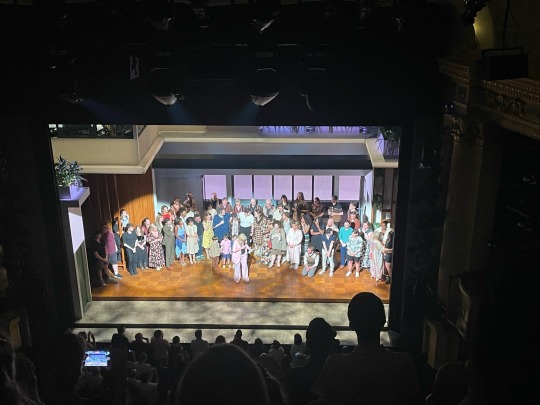
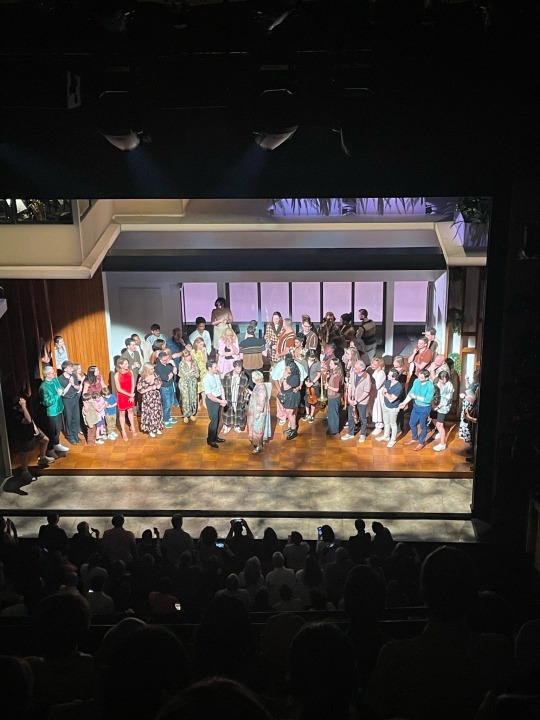




51 notes
·
View notes
Text
Supreme Court Overturns DOJ's Use of Key J6 Felony Court
"Today's decision means Attorney General Merrick Garland and federal judges in Washington wrongfully prosecuted roughly 350 J6ers with the post-Enron felony"
JULIE KELLY
JUN 28, 2024 In a devastating but well-deserved blow to the Department of Justice’s criminal prosecution of January 6 protesters, the U.S. Supreme Court today overturned the DOJ’s use of 18 USC 1512(c)(2), the most prevalent felony in J6 cases.
The statute, commonly referred to as “obstruction of an official proceeding,” has been applied in roughly 350 J6 cases; it also represents two of four counts in Special Counsel Jack Smith’s J6-related criminal indictment of Donald Trump in Washington.
In a 6-3 decision, Chief Justice John Roberts wrote that the “c2” subsection is tethered to the “c1” subsection that addresses tampering with a record, document, or “object.”
From the opinion:
Roberts was joined by Justices Clarence Thomas, Samuel Alito, Neil Gorsuch, Brett Kavanaugh, and Ketanji Brown Jackson. Justice Amy Coney Barrett authored the dissent (!) joined by Elena Kagan and Sonia Sotomayor.
Today’s decision means hundreds of Americans have been wrongfully prosecuted by Attorney General Merrick Garland as he insists his department is dedicated to upholding the “rule of law” and pursuing justice “without fear or favor.”
An Irreversible Black Eye for DOJ and Federal Courts in Washington
The matter originated in the case of Joseph Fischer, a Pennsylvania man who attended Trump’s speech and later went to the Capitol. According to court documents, Fischer briefly entered the building around 3:25 p.m., nearly an hour after the joint session of Congress to certify the electoral college votes had recessed. He exited about four minutes later.
In March 2021, a D.C. grand jury indicted Fischer on numerous counts including 1512(c)(2). The statute reads:
Whoever corruptly—
(1) alters, destroys, mutilates, or conceals a record, document, or other object, or attempts to do so, with the intent to impair the object’s integrity or availability for use in an official proceeding; or
(2) otherwise obstructs, influences, or impedes any official proceeding, or attempts to do so.
It is punishable by up to 20 years in prison.
Fischer, in addition to many J6ers facing the count, asked his judge to dismiss the charge. Judge Carl Nichols, appointed by Trump, dismissed the count against Fischer and two other defendants by finding the language in the post-Enron/Arthur Anderson statute covered tampering with records or documents not interrupting a meeting of Congress. The DOJ appealed Nichols’ decision.
In December, SCOTUS granted Fischer’s petition to grant cert seeking to reverse the appellate court’s mandate. Oral arguments were held on April 16.
Nichols is the only judge to have dismissed the count; 18 district and circuit court judges in Washington refused to dismiss the count. The judges essentially enabled the Biden DOJ’s unlawful pursuit of Americans who protested Biden’s election that day.
The List of Shame:
Judge Beryl Howell (Obama, former chief judge)
Judge James Boasberg (Obama, current chief judge)
Judge Rudolph Contreras (Obama)
Judge Trevor McFadden (Trump)
Judge John Bates (GW Bush)
Judge Amit Mehta (Obama)
Judge Dabny Friedrich (Trump)
Judge Royce Lamberth (Reagan)
Judge Richard Leon (GW Bush)
Judge Colleen Kollar-Kotelly (Clinton)
Judge Amy Berman Jackson (Obama)
Judge Timothy Kelly (Trump)
Judge Randolph Moss (Clinton)
Judge Paul Friedman (Clinton)
Judge Christopher Cooper (Obama)
D.C. Circuit Court Judge Florence Pan (Biden)—Pan wrote both appellate court decisions upholding 1512c2
D.C. Circuit Court Judge Justin Walker (Trump)
D.C. Circuit Court Judge Cornelia Pillard
There Goes Your Summer, Your Honor
The federal courthouse in Washington has been bracing for a flood of motions post-Fischer; a few judges have released individuals from prison in anticipation of a reversal. Roughly 110 J6ers have been sentenced to prison on 1512(c)(2) convictions; several J6ers were held under pretrial detention for being charged with the nonviolent obstruction count alone.
But despite the law’s legal limbo over the past year, U.S. Attorney for the District of Columbia Matthew Graves, a Biden appointee, continued to indict J6ers on 1512(c)(2) while some judges continued to sentence those convicted to lengthy prison terms. Last month, Beryl Howell, the former chief judge who upheld the 1512(c)(2) charges for defendants in her courtroom, sentenced a Missouri man to 60 months in prison for the 1512 conviction and assault on police.
In January 2022, Howell gave the green light for her colleagues to support the DOJ’s use of the obstruction count. Here is what she said in denying a motion to dismiss filed by two J6ers:
“For over 200 years, the peaceful transition of power from one presidential administration to another has been marked with Congress's certification of the Electoral College vote; and this event has been respectfully observed by American citizens, but not on January 6, 2021. And I start with this historical fact because what happened on January 6th was a chilling new type of criminal conduct to which our criminal laws have never before had to be applied. Application of criminal laws to conduct never before seen, like what occurred on January 6, 2021, appropriately generates the kind of legal questions the defendants raise here about whether the criminal law fits the charged criminal conduct.”
The first judge to uphold the obstruction charge in J6 cases was Trump-appointee Dabny Friedrich. In 2021, she agreed that interrupting a meeting of Congress met the definition of “official proceeding” and that the statute’s broad language did not require the government to prove the conduct involved tampering with records or documents.
Ironically—or not—Friedrich is married to Matthew Friedrich, a former DOJ official who worked on the Enron Task Force alongside Andrew Weissman and current deputy attorney general Lisa Monaco. The 1512(c)(2) statute was a product of the Enron/Arthur Anderson investigation; Weissmann, as the lead prosecutor for Special Counsel Robert Mueller in the bogus Russiagate probe, pushed the DOJ to charge Trump with 1512(c)(2) while in office.
Retired judge Thomas Hogan recently warned how a SCOTUS’s reversal of 1512(c)(2) would affect the DC courthouse. Here is Hogan, who upheld the statute in J6 prosecutions, with former DOJ official and FISAgate mastermind Mary McCord:
Reacting to the SCOTUS decision, Geri Perna, aunt of Matthew Perna, told me this by email:
“When Matthew was unexpectedly charged with the felony of Obstruction of an Official Proceeding—after initially facing only misdemeanors—his world collapsed. The weight of a potential lengthy prison sentence bore down on him, filling his days with insurmountable worry and anxiety. At that time, there was no glimmer of hope that this severe charge would be dropped.
Matthew has now been dead for 28 months. In the wake of his passing, the Supreme Court of the United States is finally set to rule on whether the Department of Justice wrongfully applied 1512(c)(2) in January 6 cases. As much as I am hopeful for a just ruling in favor of the January 6 defendants, I am consumed by a profound sense of loss and anger. My nephew's death was both avoidable and senseless.
I feel cheated, and if that sounds selfish, then so be it. The pain of losing Matthew under such circumstances is a burden I carry every day. I fervently hope that those responsible for wielding this charge erroneously will be held accountable in a court of law. However, I am not holding my breath.”
15 notes
·
View notes
Note
We need a play with David Tennant and all of his friends in it.
If only any producer could afford David Tennant, Michael Sheen, Catherine Tate, Billie Piper, Olivia Colman etc etc. (save us Sonia Friedman. Save us)
28 notes
·
View notes
Text
Report: Eddie Redmayne’s lengthy commitment to Cabaret on Broadway — and its whopping budget
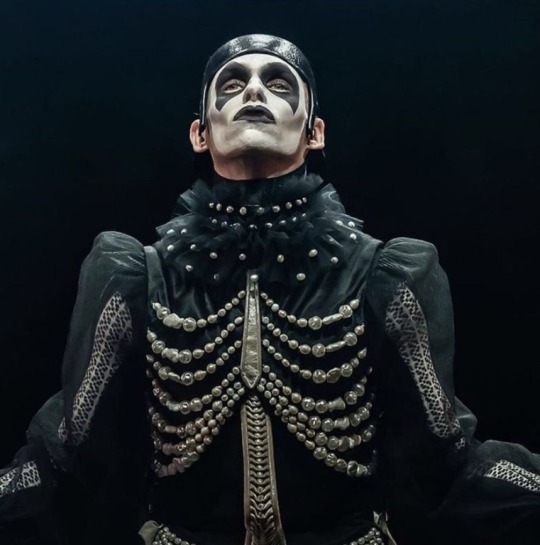
A exclusive report today from Philip Boroff and his Broadway Journal says Eddie Redmayne is committing to an expensive New York production of Cabaret for six months.
‘CABARET’ IS COSTLIEST BROADWAY REVIVAL
by Philip Boroff
EXCLUSIVE: Investing in Cabaret at the August Wilson Theatre this spring might seem like a safe bet, after the success of the Kander & Ebb classic in London and earlier productions in New York.
That's until you see the price tag: $24.25 million, a record for a Broadway revival.
Broadway Journal reviewed a preliminary budget and recoupment chart for the transfer from the West End, which is being presented by the multinational theater operator and producer Ambassador Theatre Group and U.K.-based Underbelly, which creates shows and festivals. Tony and Oscar-winner Eddie Redmayne will reprise his role as Kit Kat Club emcee on Broadway.
Revivals of musicals by John Kander and Fred Ebb have been golden on Broadway, particularly the concert version of Chicago, now in its 27th year; and two Roundabout Theatre Co. engagements of Cabaret. This production, which follows several new musicals into the financial stratosphere, needs to be a smash to repay investors.


Cabaret‘s largest line item is its $9.4 million physical production. That includes millions from investors to transform the August Wilson into a Weimar-era nightclub, designed by Tom Scutt, where the show will be performed for an audience of about 1050. (There’s also a pre-show with actors and musicians interacting with the audience.) Another $1.5 million is allocated for a “refurbishment reserve,” presumably for cost overruns. A production spokesman declined to comment for this story.
For the 2021 premiere, Ambassador Theatre Group paid most of the expense of renovating London’s Playhouse Theatre (where the show’s performed in the round), someone familiar with the production said. As is standard in the industry, backers benefit from the sale of tickets but don’t share in revenue from drinks or food.
The New York production is what’s known as a related-party transaction: ATG is both producer and landlord. It recently bought a majority stake in the August Wilson along with Jujamcyn Theaters’ four other Broadway venues.
One of the busiest players on Broadway, ATG and subsidiary Sonia Friedman Productions are producing four of the 16 plays and musicals opening this season through December: The Shark is Broken, Gutenberg! The Musical!, Merrily We Roll Along and Appropriate (with Second Stage Theater). It’s controlled by Providence Equity Partners, a mammoth private equity manager that buys companies with the eventual aim of reselling them at a profit.


Cabaret must thrive to survive, requiring a weekly $1.2 million at the box office to pay its bills. That’s one of the biggest nuts on Broadway, even more than the time-travel spectacle Back to the Future projected in its recoupment chart. Back to the Future‘s home, the Winter Garden Theatre, has about 50 percent more seats than the reconfigured August Wilson, which will lose about 200 seats in the renovation.
Investing may be most appealing for patrons who prioritize backing a prestigious and artful show (and a leading Tony contender) over return on investment. Rebecca Frecknall’s dark revival won seven Olivier Awards last year in London, including for Redmayne. He’s committed to reprising his role for six months, two people familiar with the production said. ATG and Underbelly haven’t disclosed details about the transfer, including casting.
When it opened in London in 2021, Cabaret got flak on social media for its prices, now as much as £375 (equivalent to about $465, which includes a light three-course meal and champagne). Producers have told investors that the show played to 96 percent occupancy through July, with the highest average ticket price in London.
Broadway seats may be costlier. The average ticket at 110 percent capacity of the August Wilson — i.e. with premium pricing — is projected to be $248. That’s approaching Hamilton in its peak years, when it was charging as much as $849 a ticket.
If Cabaret can command that $248 average and sell out — grossing $2.1 million a week — recoupment will take about a year. (Hamilton, which cost half as much as Cabaret and has low running costs, was distributing profits six months after opening night.)
By selling out with an average ticket of $176 — Sweeney Todd territory — Cabaret‘s recoupment would take closer to two and a half years. With an average ticket of $158 — $1.3 million a week — recoupment would take four and a half years. (Projections in this story are based on recouping $20.9 million, which excludes Cabaret‘s reserves, deposits and advances; and receiving a $3 million state production tax credit, which can take years to get to investors. If the show dips into reserves during construction or the run, recouping may take longer.)
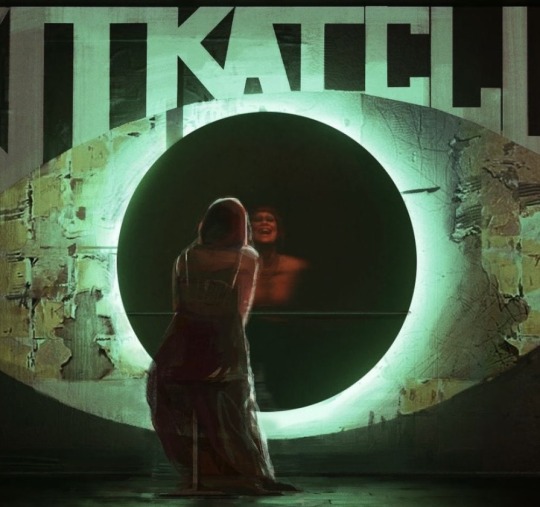

Musical revivals have gotten ever-pricier to produce, but none has approached Cabaret. For example, Sweeney Todd was capitalized at $14.5 million and appears to be on track to recoup later this fall, after about 33 weeks. Hello, Dolly! was capitalized at $16 million in 2017 (about $20 million today) and earned a small profit; last year’s $16.5 million Funny Girl recouped and is expected to make a profit.
Shows that required extensive renovations have a mixed record. Most recently, Here Lies Love, the $22 million disco-themed historical drama around the corner from the August Wilson, is struggling at the box office; whereas Harry Potter appears to be enjoying a long life in ATG’s souped-up Lyric Theatre, after producers trimmed the two-part show to one. But it arrived from London at considerable expense. In addition to Harry Potter’s $35.5 million capitalization, ATG, which competed against other landlords for the play, spent tens of millions of dollars clearing out and renovating the Lyric, Michael Paulson reported in the New York Times.
Revivals are typically short-lived, Cabaret as well as Chicago being obvious exceptions. The Roundabout Cabaret revival directed by Sam Mendes and Rob Marshall opened at the Henry Miller’s Theatre in 1998 and ran through 2004. It initially starred Alan Cumming, who stepped in again when the Roundabout revisited the revival in 2014.
Two decades ago, the Roundabout bought its revival’s most recent home, Studio 54. The nonprofit company, with help from the city of New York, paid $22.5 million for the real estate, which looks like a bargain today.
#eddie redmayne#cabaret on broadway#philip boroff#august Wilson theatre#ATG Productions#cabaret at the Kit Kat club london
19 notes
·
View notes
Text
there's a new article out about the play. i think it's paywalled for people outside of the us, so here's a twitter thread with screenshots. i've also typed it all out under the cut here:
LONDON – Next month, the Upside Down extends its tentacles into London’s West End with “Stranger Things: The First Shadow,” a prequel stage production that expands the world of Netflix’s sci-fi/horror blockbuster.
And the creative team behind it hopes the play will be as groundbreaking as the series itself.
“We’re about to bring the actors, who’ve just been in this cocoon of a rehearsal room for seven weeks, into [the theater],” producer Sonia Friedman says of “The First Shadow,” which is set to open Noc. 17 at the Phoenix Theatre. “We’ve been making sure it can stand alone without the special effects, because it’s all about story. We are going to blow people’s minds. We are going to terrify with some of the most startling, extraordinary things with the physical production.”
The project originated with director Stephen Daldry, who approached Netflix’s then-content chief Cindy Holland after the show’s first season aired.
“One of the conversations Stephen and I had been having was, ‘What theater have we ever seen where you get genuinely scared?’” Daldry’s co-director Justin Martin says. “It was an interesting challenge and provocation. We talked about other [Netflix] titles, but this one felt like the most imaginative and the most challenging to try and find a stage language for.”
“The goal was to figure out, what does a mega episode of ‘Stranger Things’ look like on stage?” adds Matt Duffer, who created the series with brother Ross. “It was a very long, multi-year process to figure that out. But where they’ve landed is incredibly exciting.”
For the Duffers, the idea of expanding the “Stranger Things” universe in new forms was an exciting prospect. They're currently working on several spinoff shows, including a children’s animated series and an anime series. The play exists on its own, but it also informs the narrative and characters fans know.
“The idea was to explore Henry Creel and his backstory and fill in a gap that we don’t explore in Season 4,” Ross Duffer says of the villain also known as Vecna. “The play was being developed simultaneously with us writing Season 4 so we were adjusting as we went. It was an interesting way to develop a story, but to do it concurrently like that made sure everything locks in mythology-wise.”
Development on “The First Shadow” began during Season 2. Daldry approached Friedman after seeing the magic and spectacle in her company’s production of “Harry Potter and the Cursed Child” at London’s Palace Theatre. The creative team spent time brainstorming the story during the early months of the pandemic with screenwriter Jack Thorne, but eventually decided they needed someone who knew the series intimately.
Kate Trefry, a writer on “Stranger Things” since Season 2, was an obvious choice for Daldry, despite the fact that she’d never written a play before.
“Season 2 is really when we started to expand this world and mythology,” Ross Duffer says. “So Kate knows that as well as us. She's been with us in the trenches for so many years that we were so happy that she had this opportunity to do this.”
From early on, no one wanted to simply remake the first season. Daldry wanted the story to be what Martin calls “in the center of the conversation,” rather than a secondary narrative, so a prequel made the most sense.
“When we met with Stephen we had just cracked this Henry Creel stuff in the writers room,” Ross Duffer says. “We said, ‘Well there might be an opening here.’ And Stephen really fell in love with it.”
“There are questions of ‘Why Hawkins?’ and ‘How did all this stuff happen?’” Martin adds, referring to the show’s fictional Indiana town, which becomes a hotbed of supernatural activity. “This felt like a good way to address that.”
“The First Shadow,” set in Hawkins in 1959, is told over two chapters. Several familiar characters appear, including Bob Newby, Joyce Maldonado and Jim Hopper, who are in their last year of high school when a new student named Henry Creel arrives. Nearby, Dr. Brenner is getting his start in his lab. There are also new characters, like Bob’s sister Patty Newby. Trefry calls it an ensemble play with Henry Creel as the “spine” of the story. Beyond that, everyone involved is as tight-lipped about the plot as they are about the forthcoming grand finale of the Netflix original.
“It’s about outsider kids who come together to solve a mystery,” Martin says. “And in doing so find themselves and each other. That's really ultimately what ‘Stranger Things’” does so well and why so many people connect with it.”
Trefry adds that it’s also “about the loss of innocence and coming of age and how you are changed and ruined and saved by these formative events that happened in high school.”
“So, hopefully, you’ll see that Hopper and Joyce and Bob are all presenting echoes of the trauma that is at the center of this play,” she says.
In the first season of “Stranger Things,” Joyce, Bob and Hopper seem surprised by what’s going on in Hawkins. But Trefry confirms there’s an explanation for why they don’t immediately connect it to their high school years.
“The climactic events that happen within these two stage episodes had to be something that could be written off as not magical or science fiction,” she says. “It had to be spectacular and make sense, but we had to go forward in honesty with our characters.”
As a TV series, “Stranger Things” has a recognizable aesthetic. The Upside Down and its monsters are familiar to viewers, so a stage version needed to incorporates similar visuals.
Because Trefry had never written a play, she didn’t worry about whether certain effects or scenes would be possible, which upped the ante for everyone included.
“She cross-cut scenes as she would in the show and wrote crazy visual effects sequences as she would in the show,” Matt Duffer says. “She wasn’t limited by that because it then just presented a challenge for Stephen to solve, which is fun. The opening sequence of the play -- I don’t think anyone even knew if it was possible. I'm still not sure how they’re doing it.”
Friedman and Daldry put together a notably skilled creative team. Friedman set the bar high from the outset, telling them, “I need to be taken to a new dimension of what is possible with theater.”
That team includes illusions design and visual effects artists Jamie Harrison and Chris Fisher, who are responsible for the onstage magic in “Harry Potter and the Cursed Child.” Harrison and Fisher spent nearly a year coming up with the effects in “The First Shadow” and have continues perfecting things during rehearsals.
“It’s very pressurized because there is nothing worse than a bad effect because the audience knows straight away,” Harrison says. “We have to go through quite a lot of watching our work be quite bumpy before it gets smooth. And we have to bring the actors from zero magic skill to being very expert in a condensed period of time.”
“When you have the world of ‘Stranger Things,’ people know it,” Fisher adds. “They have those big sequences, so we naturally are creating big sequences. We’ve pushed it and I think by us pushing, the directors and Kate have pushed us even more and said, ‘Now we know you can do that, we want this.’”
As a series “Stranger Things” relies on CGI alongside practical effects, but onstage everything has to be done for real. 59 Productions are creating the video design and visual effects for the play, which will work in tandem with the illusions and Miriam Buether’s set design. Harrison says that “anything that can be achieved in film can be achieved in theater.”
“In film, people want absolute reality,” Harrison says. “For the effects to be visually real. In the theater, we have a level of imagination that we can use as well. For example, in the piece we’re creating there are a lot more blood and guts.”
Trefry adds that the stage show is genuinely terrifying. “It’s scary like ‘Stranger Things’ is scary,” she says. “There’s a little bit of like guts and gore, and then there’s also real trauma – people dealing with real stuff.”
Other elements of the production will hint at the series as well. For instance, Harrison and Fisher met with the creature designer from the series during their design process to ensure “visual continuity,” although they won’t say which creatures appear in the play. And D.J. Walde’s original music recreates the familiar synth theme song with a theremin that matches the late 1950s setting.
For the Duffers, bringing the “Stranger Things” universe to life on stage satisfies their love of practical effects.
“The downside of CGI is that the audience is conditioned to the fact that we can basically do anything,” Matt Duffer says. “But there’s something about seeing it actually done. When I saw ‘Cursed Child,’ my jaw was dropping in a way it rarely does now with these big movies. We want to do the same here.”
Because Trefry wrote the play while Season 4 was in development, the series’ writers were able to retrofit elements of that season to reflect the stage show. The events of the play will also help to “enrich” Season 5, Matt Duffer says.
“There’s a ton of conversation and dialogue between this play and the events that happen in Season 5,” Trefry says of the final season, which is over halfway written. “It was about trying to create something that is canon, but where you don’t have to see it to see Season 5. But if you do see it, it’ll make Season 5 better.”
“There are hints of where [the show] is going to go,” Ross Duffer adds. “I think when [Season] 5 comes together, all of those pieces will hopefully click.”
“The First Shadow” tickets are currently on sale through Aug. 25, 2024, although Friedman confirms the case signed one-year contracts and the production is open-ended. The plan is to bring the play to Broadway and the rest of the U.S. as soon as possible.
“Hopefully it can get to as many places as it can so as many fans as possible can experience it,” Matt Duffer says. “That’s one thing we’re trying to figure out: How do we make sure people are able to see it before Season 5 releases?”
“The First Shadow” marks the beginning of a broader universe for “Stranger Things.” The Duffers say they can’t “focus on the spinoffs until we’re landed the plan with Season 5,” but so far they’ve enjoyed letting other artists re-imagine their ideas.
“This was originally pitched as a standalone story and so to be here now is surreal,” Ross Duffer says. “But this has been the most rewarding experience for us creatively."
#bolded some things that stand out to me#plot relevant things and how things connect to s5 and such#article/twitter thread also has a few pics of cast and crew at rehearsal#i won't read or post a ton of articles for this or s5 tbh#i don't care to see how many of them are just about character deaths/characters needing to die for some reason#since that's the big obsession with final seasons and coverage of final seasons#it annoys me#the first shadow#the first shadow spoilers#s5#st5 spoilers#spoilers#and also i feel like a lot of what they say in these articles sets people's expectations like. super high and specific#and then people always complain when what they've told themselves is going to happen doesn't#it's an endless cycle and i'm not here for it#anyway. i have to wonder about the bob of it all
12 notes
·
View notes
Text
The complete text of Jonathan’s Tony Awards speech:
Thank you.
I grew up in a house surrounded by cornfields in Lancaster County Pennsylvania.
I was raised by my parents Jim and Julie Groff and my brother David and the three of them are sitting right there.
Thank you for letting me dress up like Mary Poppins when I was 3. Thank you for letting me act out scenes from ‘I Love Lucy’ on my 10th birthday. Thank you for always allowing my freak flag to fly without ever making me feel weird about it.
Even if they didn't always understand me, my family knew the life-saving power of fanning the flame of a young person's passions without judgment. I walk through life with an open heart because you let me know that I could.
Thank you to all of my teachers back in Pennsylvania especially Sue Fisher, who told me I could do this for a living.
I moved to New York exactly 20 years ago this year and I got a job waiting tables and became a volunteer for Broadway Cares/Equity Fights AIDS and all I wanted was to be a part of this community.
Thank you to everyone involved in Spring Awakening who not only made that dream come true but inspired him to come out of the closet when I was 23.
I’m now 39, and musical theater is still saving my soul.
Maria Friedman, thank you for letting me be your Franklin Shepard in this production of Merrily and allowing me the chance to accept, respect and express both the lightest and darkest parts of myself.
Daniel Radcliffe and Lindsay Mendez, you are more than old friends; you are soulmates and I’m looking forward to watching each other change for the rest of our lives.
Thank you to every member of the extraordinary cast for lifting this Merrily into the spiritual stratosphere.
Thank you to every person working inside the Hudson Theatre. Thank you New York Theatre Workshop.
Thank you Jim, Lonny, Ann and the original creative team of Merrily.
A special thank you to Sonia Friedman, Jim Carnahan, Tom Broecker, Hayley King, Joe Machota and Jenny Tversky. Happy birthday to Rick and Max.
And finally, I just want to say that when I was a kid in Pennsylvania, I used to record the Tony Awards on a VHS tape and watch the performances over and over again.
To actually be able to be a part of making theater in this city and just as much to be able to watch the work of this incredible, incredible community has been the greatest gift and pleasure of my life.
And I thank you, and thank you so much for this honour.
Credits:
Sonia Friedman (lead producer and Maria’s sister), Jim Carnahan (casting director), Tom Broecker (costume consultant), Hayley King (dresser), Joe Machota (CAA agent), Jenny Tversky (publicist), (happy birthday to) Max (Rackenberg, one of the Frank Jr’s in the show).
Jim Walton, Lonny Price and Ann Morrison were the original leads of Merrily on Broadway.
58 notes
·
View notes
Text
Apparently Emma D'Arcy (Rhaenyra Targaryen) and Elliot Grihault (Lucerys Velaryon) have an association which pre-dates House of the Dragon.
Game of Thrones prequel House of the Dragon is full of grey characters, Queen Rhaenyra Targaryen being one of them. Played by Emma D’Arcy, Rhaenyra does have a few redeeming qualities to her, one of them being her love for her children, and the way she raised them. That’s why fans were really sad when Lucerys (Elliot Grihault) was killed in the Season 1 finale. However, D’Arcy might have met their on-screen son even before House of the Dragon.
An amazing find by the Twitter account @velaryonfruits, they reported that Emma D’Arcy and their partner went to watch a Harry Potter play in London back in 2019, when the news of their casting as Princess Rhaenyra was still fresh in the air. Elliot was playing a significant role in that theatre production at the time.
Because Twitter/X may have a rather tenuous future, I've downloaded the photos which @velaryonfruits posted there.

Grihault was playing the role of young Harry Potter in Harry Potter and the Cursed Child which was held in London’s The New West End theatre back in March 13, 2019. The play was produced by Sonia Friedman and directed by John TiffanyPalace.
If you need further proof, Elliot posted this on Instagram.

He has grown remarkably fast – faster than the younger Stark kids in GoT.
Given his character's early departure from HotD, perhaps he'll have time for additional stage acting.
#game of thrones#house of the dragon#emma d'arcy#rhaenyra targaryen#elliot grihault#lucerys velaryon#harry potter and the cursed child#gra o tron#ród smoka#la maison du dragon#дім дракона#하우스 오브 드래곤#juego de tronos#jogo dos tronos#a casa do dragão#la casa del dragón#isang kanta ng yelo at apoy#龙之家族#হাউস অফ দ্য ড্রাগন#gia tộc rồng#آل التنين#haus des drachen#ejderha evi#rod draka#σπίτι του δράκου#дом дракона#ڈریگن ہاؤس#lohikäärmeen talo#בית הדרקון
9 notes
·
View notes
Text
Here's info on STRANGER THINGS: THE FIRST SHADOW, the new stage show set in the world of the series, coming to the West End later this year.
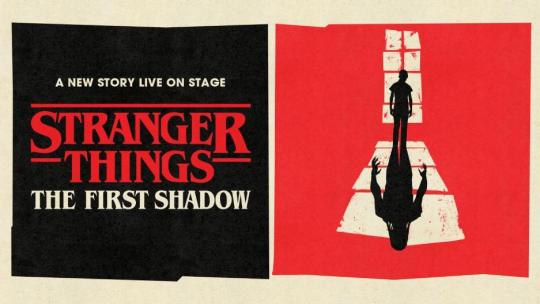
Hawkins, 1959: a regular town with regular worries. Young Jim Hopper’s car won’t start, Bob Newby’s sister won’t take his radio show seriously and Joyce Maldonado just wants to graduate and get the hell out of town. When new student Henry Creel arrives, his family finds that a fresh start isn’t so easy… and the shadows of the past have a very long reach.
Brought to life by a multi-award-winning creative team, who take theatrical storytelling and stagecraft to a whole new dimension, this gripping new adventure will take you right back to the beginning of the Stranger Things story – and may hold the key to the end.
Matt and Ross Duffer said: “We are beyond excited about Stranger Things: The First Shadow. Collaborating with the brilliant Stephen Daldry has been nothing short of inspiring, and Kate Trefry has written a play that is at turns surprising, scary, and heartfelt. You will meet endearing new characters, as well as very familiar ones, on a journey into the past that sets the groundwork for the future of Stranger Things. We’re dying to tell you more about the story but won't - it’s more fun to discover it for yourself. Can’t wait to see you nerds in London!”
Sonia Friedman said: “The world and mythology of Stranger Things has enabled a rich and fertile ground for creating an incredible story for the stage. The Duffer Brothers have built a huge global following for good reason, and a world-class creative team has built on their boundless imagination to dream up an unbelievably exciting theatrical event for our audiences. Set within the canon of Stranger Things, this new play opens in London, with the West End hosting the only place in the world to experience this new story – for now. I’m thrilled to reunite with my visionary long-term collaborator Stephen Daldry. Together, with our brilliant Netflix partners, we can’t wait to welcome Stranger Things fans into theatre, and theatregoers into the realm of Stranger Things.”
Greg Lombardo, VP Live Experiences for Netflix said, “Stranger Things has captured the imagination of fans around the world and we are incredibly thrilled to expand this exciting universe with Netflix’s first live stage production. With the creative talents of Matt and Ross Duffer combined with Sonia Friedman and Stephen Daldry, theatregoers will be swept up in a truly epic event worthy of Stranger Things.”
STRANGER THINGS: THE FIRST SHADOW will be directed by Stephen Daldry with co-director Justin Martin, set design by Miriam Buether, costume design by Brigitte Reiffenstuel, lighting design by Jon Clark, sound design by Paul Arditti, illusions design by Jamie Harrison & Chris Fisher, video design by 59 Productions, movement direction by Coral Messam, wigs, hair and make-up design by Campbell Young Associates, casting by Charlotte Sutton CDG, international casting consultancy by Jim Carnahan, Gary Beestone for Gary Beestone Associates is Technical Director, with further creative team members to be announced.
12 notes
·
View notes
Photo






Star Trek The Next Generation Shadowheart #1 (December 1994) by DC Comics
Written by Michael Jan Friedman, drawn by Steve Erwin and Charles Barnett, cover by Sonia Hillios.
#Star Trek#The Next Generation#DC Comics#1994#Lieutenant Worf#Worf#Star Trek The Next Generation#Star Trek TNG#TNG#Vintage Comics#Etsy#Comic Books#Comics#Klingon#Michael Jan Friedman#Steve Erwin#Charles Barnett#Sonia HIllios
1 note
·
View note